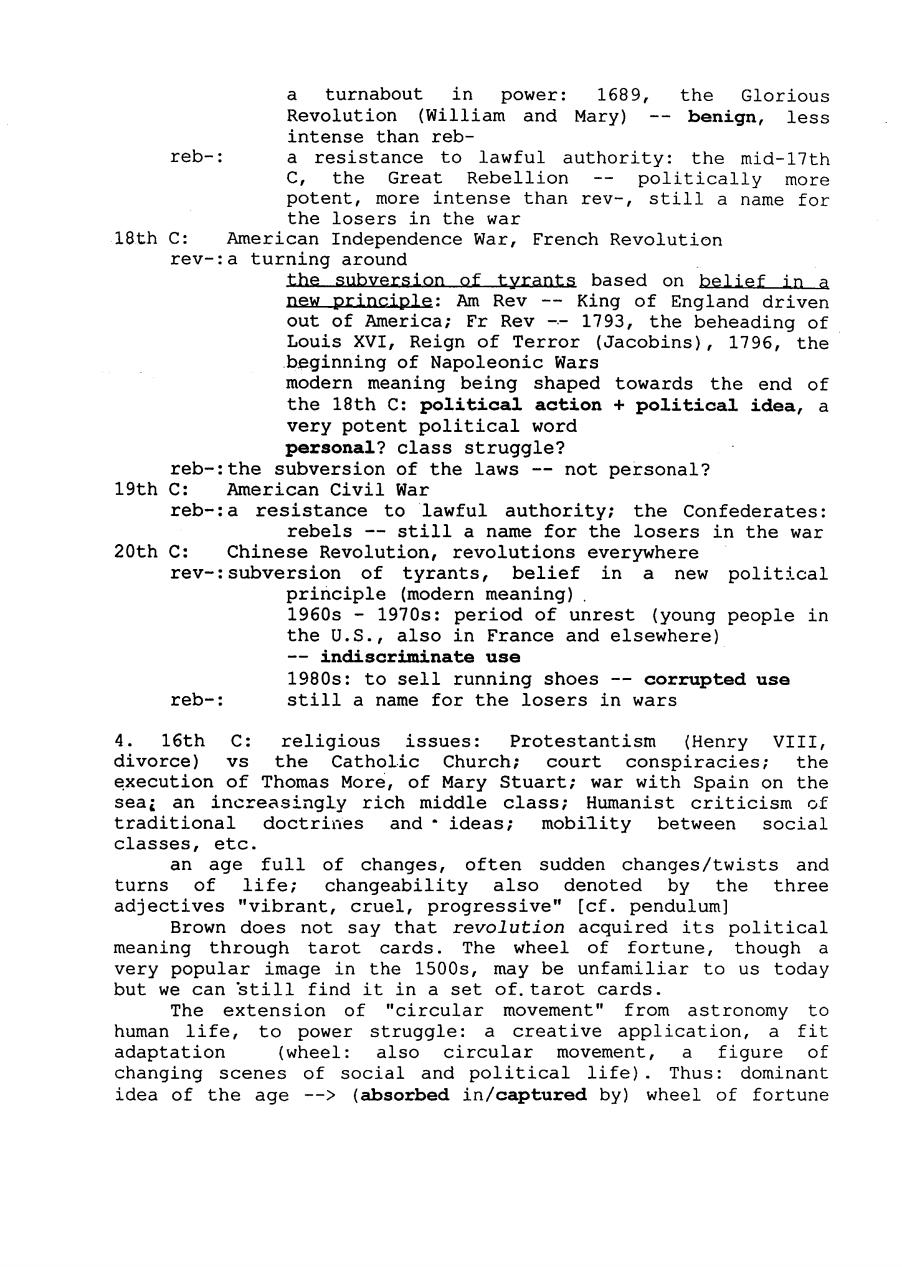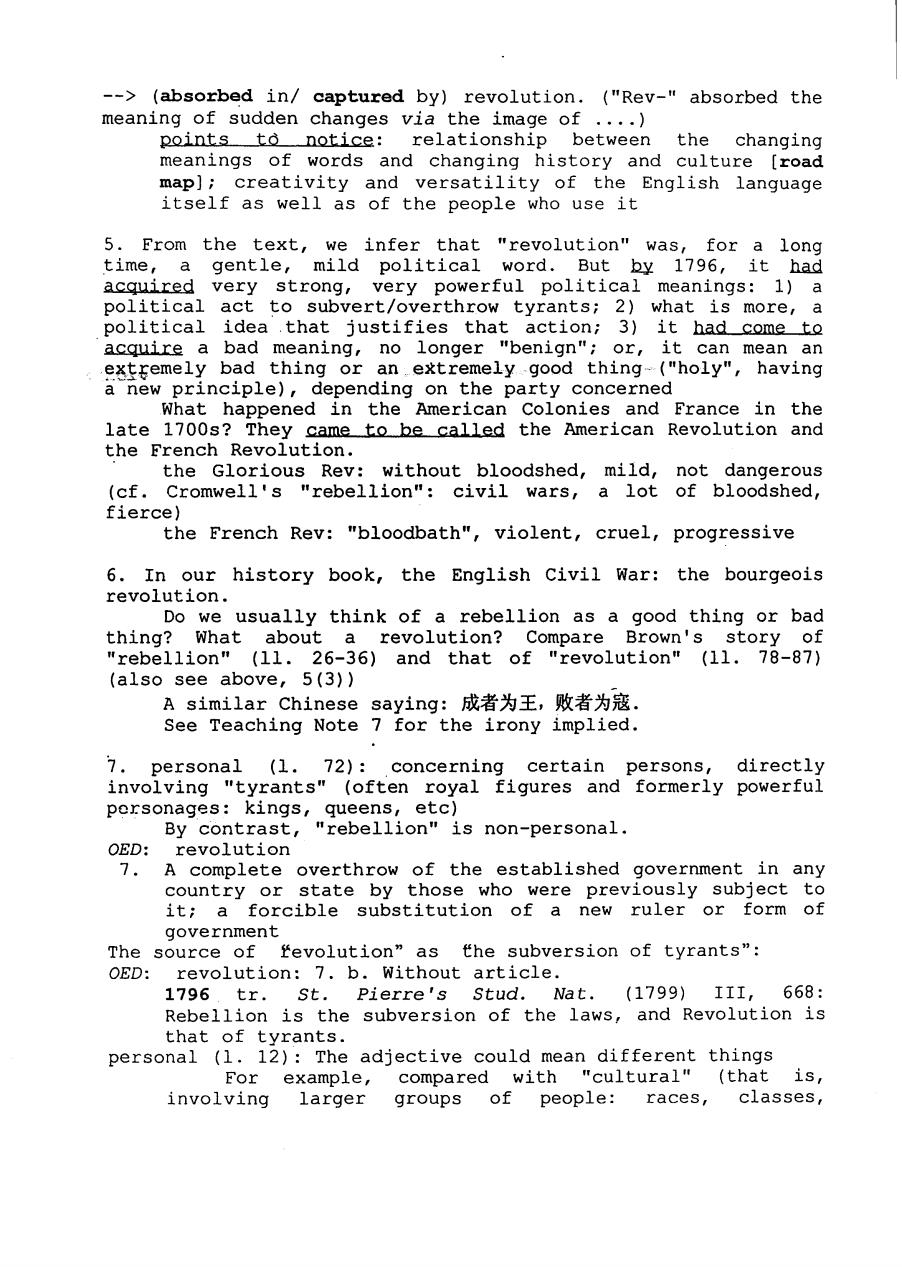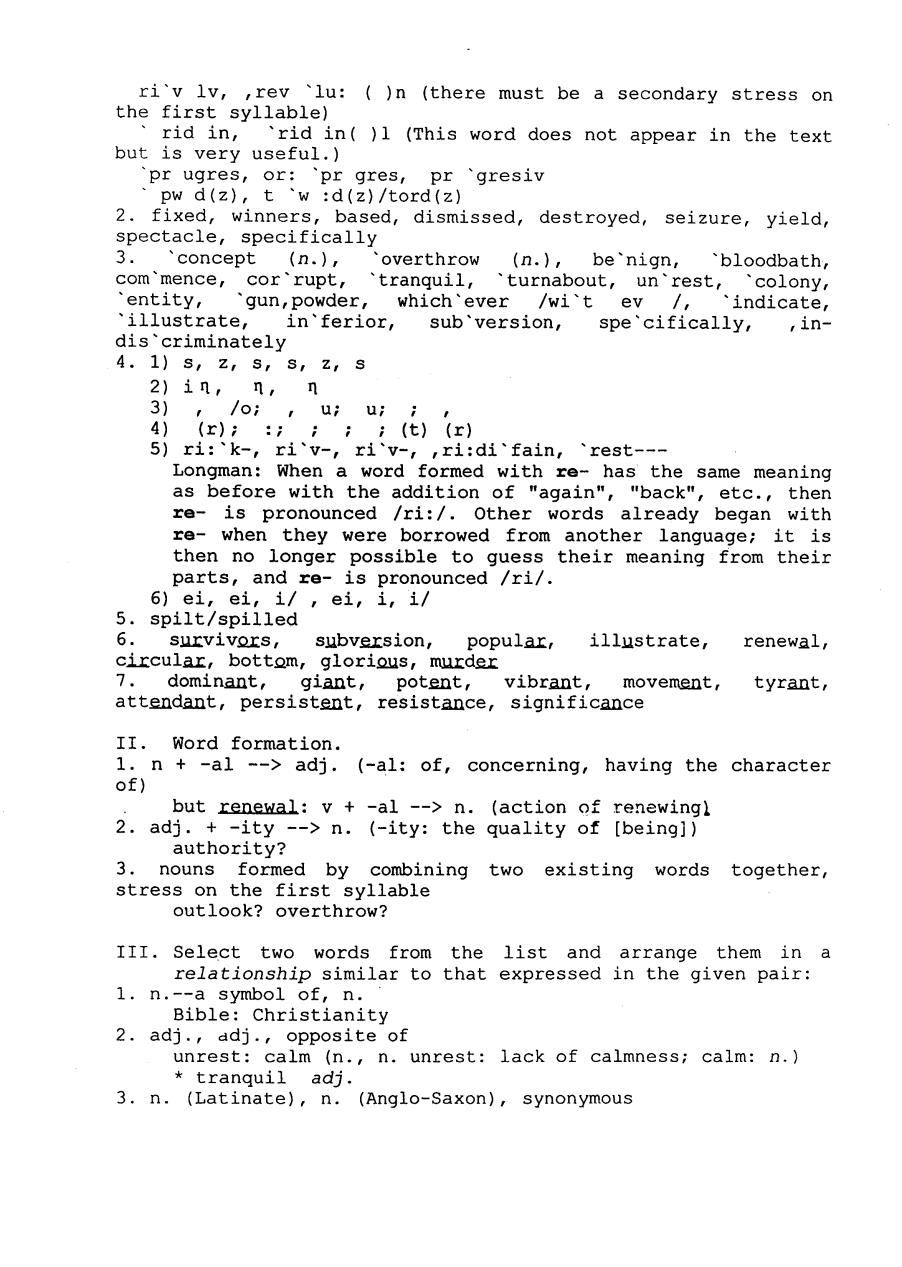
1.road map of a culture (spatial metaphor,relationships seen at a glance) where its people come from and where they are going (continuing the map image:travelling--origin,point of departure, direction,change,progress) pendulum contrasted with fixed entity similarly (not a metaphor or simile):meaning in flux (1.14)([U]continual change,condition of not being settled),shift (1.69), (of "revolution",11.40,41)meaning spilled over into politics (implicitly,liquid,something flowing,not settled or fixed) Another point:a word can have layers of meanings,literal meaning various (often hidden or preconscious)associations. 2.Latin through French;the 14th C; revolution--a turning around,used in astronomy, describing the movement of planets in space rebellion--a loaded political word,a renewal of war,used to name a resistance to lawful authority;in actual use,always a word for the losers in wars,or what winners call the losers in the 14th C,no:revolution not a political word yes:circular movement,war against lawful authority 3.[At present, do not discuss whether we should call Cromwell's action Rebellion or Revolution and other such questions. revolution rebellion 1 age events I meaningluselchangel meaningluselchange 14th C:. rev-: a turning around;applied to astronomy --no political meaning reb-: a renewal of war;a resistance to lawful authority --a loaded political word,actually what winners called the losers 16th C: sudden twists and turns of fate,life shown in the image of the wheel of fortune rev-: (original meaning)a circular movement a turnabout in power--political meaning added 17th C:Cromwell (Rev?Reb?),Restoration,Glorious Revolution rev-: a turning around

a turnabout in power:1689,the Glorious Revolution (William and Mary)--benign,less intense than reb- reb-: a resistance to lawful authority:the mid-17th C,the Great Rebellion --politically more potent,more intense than rev-,still a name for the losers in the war 18th C: American Independence War,French Revolution rev-:a turning around the subversion of tyrants based on belief in a new principle:Am Rev--King of England driven out of America;Fr Rev --1793,the beheading of Louis XVI,Reign of Terror (Jacobins),1796,the beginning of Napoleonic Wars modern meaning being shaped towards the end of the 18th C:political action political idea,a very potent political word personal?class struggle? reb-:the subversion of the laws --not personal? 19th C:American Civil War reb-:a resistance to lawful authority;the Confederates: rebels --still a name for the losers in the war 20th C: Chinese Revolution,revolutions everywhere rev-:subversion of tyrants,belief in a new political principle (modern meaning). 1960s -1970s:period of unrest (young people in the U.S.,also in France and elsewhere) --indiscriminate use 1980s:to sell running shoes --corrupted use reb-: still a name for the losers in wars 4.16thC: religious issues:Protestantism (Henry VIII, divorce)vs the Catholic Church;court conspiracies;the execution of Thomas More,of Mary Stuart;war with Spain on the seai an increasingly rich middle class;Humanist criticism of traditional doctrines and ideas;mobility between social classes,etc. an age full of changes,often sudden changes/twists and turns of life;changeability also denoted by the three adjectives "vibrant,cruel,progressive"[cf.pendulum] Brown does not say that revolution acquired its political meaning through tarot cards.The wheel of fortune,though a very popular image in the 1500s,may be unfamiliar to us today but we can still find it in a set of.tarot cards. The extension of "circular movement"from astronomy to human life,to power struggle:a creative application,a fit adaptation (wheel:also circular movement,a figure of changing scenes of social and political life).Thus:dominant idea of the age --(absorbed in/captured by)wheel of fortune

--(absorbed in/captured by)revolution.("Rev-"absorbed the meaning of sudden changes via the image of .... points to notice:relationship between the changing meanings of words and changing history and culture [road map];creativity and versatility of the English language itself as well as of the people who use it 5.From the text,we infer that "revolution"was,for a long time,a gentle,mild political word.But by 1796,it had acquired very strong,very powerful political meanings:1)a political act to subvert/overthrow tyrants;2)what is more,a political idea.that justifies that action;3)it had come to acquire a bad meaning,no longer "benign";or,it can mean an extremely bad thing or an extremely good thing-("holy",having a new principle),depending on the party concerned What happened in the American Colonies and France in the late 1700s?They came to be called the American Revolution and the French Revolution. the Glorious Rev:without bloodshed,mild,not dangerous (cf.Cromwell's "rebellion":civil wars,a lot of bloodshed, fierce) the French Rev:"bloodbath",violent,cruel,progressive 6.In our history book,the English civil War:the bourgeois revolution. Do we usually think of a rebellion as a good thing or bad thing?What about a revolution?Compare Brown's story of "rebellion"(11.26-36)and that of "revolution"(11.78-87) (also see above,5(3)) A similar Chinese saying:成者为王,败者为寇. See Teaching Note 7 for the irony implied. 7.personal (1.72):concerning certain persons, directly involving "tyrants"(often royal figures and formerly powerful personages:kings,queens,etc) By contrast,"rebellion"is non-personal. OED:revolution 7.A complete overthrow of the established government in any country or state by those who were previously subject to it;a forcible substitution of a new ruler or form of government The source of fevolution"as the subversion of tyrants": OED:revolution:7.b.Without article. 1796.tr.St.Pierre's Stud.Nat.(1799)III,668: Rebellion is the subversion of the laws,and Revolution is that of tyrants. personal (1.12):The adjective could mean different things For example,compared with "cultural"(that is, involving larger groups of people:races,classes

countries,etc,habits,ideas,values,principles), "personal"is private,individual,specific,concerning one's own experiences,reactions and feelings. Free discussion.Possibly:personal (1.72),murder (1.75),a nation devouring itself (11.76,77),bloodbath (1. 79),etc.The dispute over the naming of a historical event is very often not just a matter of personal feelings or opinions. 8.indiscriminately:not (used)strictly in its original sense, (used)carelessly--what was called a "rev-"did not end in the overthrow of tyrants or a change in power structure corrupted:(past participle of "corrupt"vt.)changed in a bad way,different from the original -to sell running shoes, "revolution"marking the change of fashion and style,anything fancy,new --no political meaning attached commercials 9.Free discussion.One sentence is omitted from the first paragraph:(..versatility.)It is the language of survivors, of conquerors,of laughter.(survivors,conquerors --to be dealt with in the supplementary material) a historical,cultural and humanist view of language:1) meaning constantly changing,developing,a never ending process;2)new meanings derived from human activities, political,cultural,etc,3)multi-meanings of words,rich associations (historical,political,cultural,personal, emotional ..)all contained,hidden,buried in words,4) words are like living beings,one can hear,see,smell,taste, feel,touch,embrace them;words are ourselves,not just "tools"("pendulum":a bit too mechanic?)... 10.1)come from,enter (via),(origin n.), 2)indicate,reveal,suggest,describe, illustrate, (explanation n.) 3)mean,carry,tie to (1.40),linger (1.31) 4)acquire,absorb,capture,yield (? come to mean,develop (into),spill (over into), redefine,recast, corrupt (ed) 5)use,apply (to),dismiss (as)(?),call/tag (n. n/adj.),(Two Rivers:draw from (a pool) Exercises I.Pronunciation and Spelling. 1.dr m,dr 'm tik;di'm kr si,dem'kr tik; reb()1 (if a verb,ribel),ribelj n; :-,:`riti,or`-r-;

、 ri'v lv,,rev lu:()n (there must be a secondary stress on the first syllable) rid in,rid in()1 (This word does not appear in the text but is very useful. pr ugres,or:pr gres,pr gresiv pw d(z),tw d(z)/tord(z) 2.fixed,winners,based,dismissed,destroyed,seizure,yield, spectacle,specifically 3.concept (n.),overthrow (n.),be'nign,bloodbath, com'mence,cor'rupt,tranquil,turnabout,un'rest,colony, 'entity,gun,powder,which'ever /wi't ev /,indicate, illustrate,in'ferior,sub'version,spe'cifically,,in- dis'criminately 4.1)s,z,s,s,Z,s 2)in,n,n 3),/o;,u;u;;., 4)(r);:;;;;(t)(r) 5)ri:k-,ri'v-,ri'v-ri:di'fain,rest--- Longman:When a word formed with re-has the same meaning as before with the addition of "again","back",etc.,then re-is pronounced /ri:/Other words already began with re-when they were borrowed from another language;it is then no longer possible to guess their meaning from their parts,and re-is pronounced /ri/. 6)ei,ei,i/ei,i,i/ 5.spilt/spilled 6.survivors,subversion,popular,illustrate, renewal, circular,bottom,glorious,murder 7.dominant,giant,potent,vibrant,movement,tyrant, attendant,persistent,resistance,significance II.Word formation. 1.n +-al --adj.(-al:of,concerning,having the character of) but renewal:v -al --n.(action of renewingl 2.adj.+-ity --n.(-ity:the quality of [being]) authority? 3.nouns formed by combining two existing words together, stress on the first syllable outlook?overthrow? III.Select two words from the list and arrange them in a relationship similar to that expressed in the given pair: 1.n.--a symbol of,n. Bible:Christianity 2.adj.,adj.,opposite of unrest:calm (n.,n.unrest:lack of calmness;calm:n. tranquil adj. 3.n.(Latinate),n.(Anglo-Saxon),synonymous